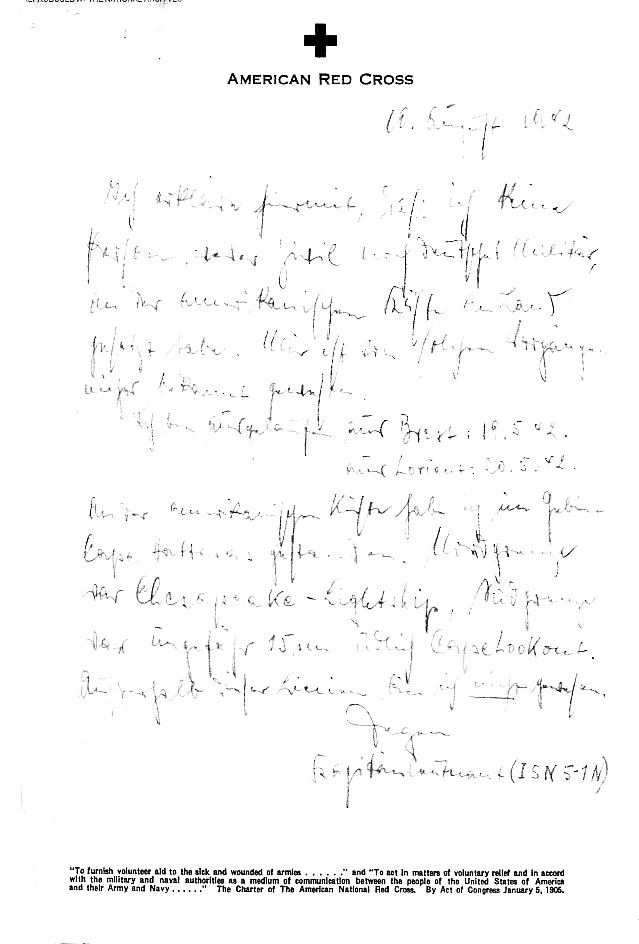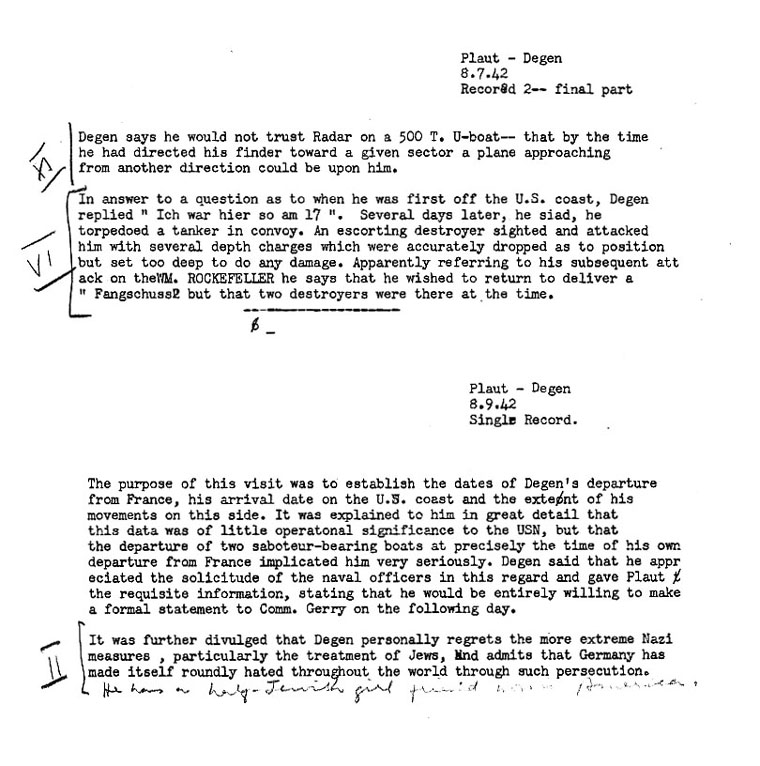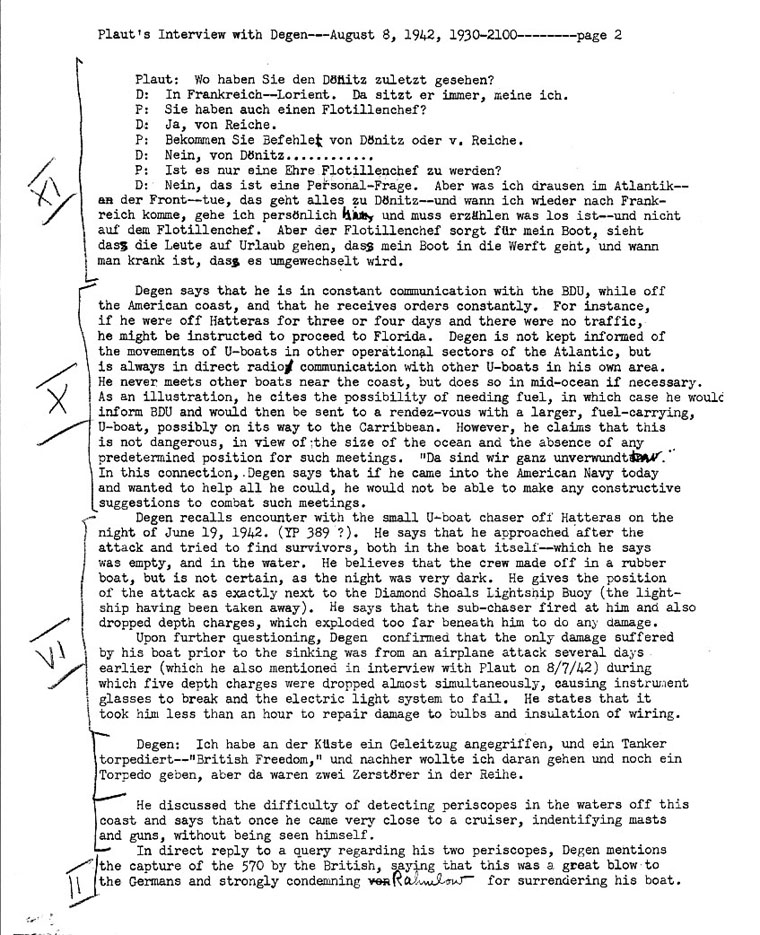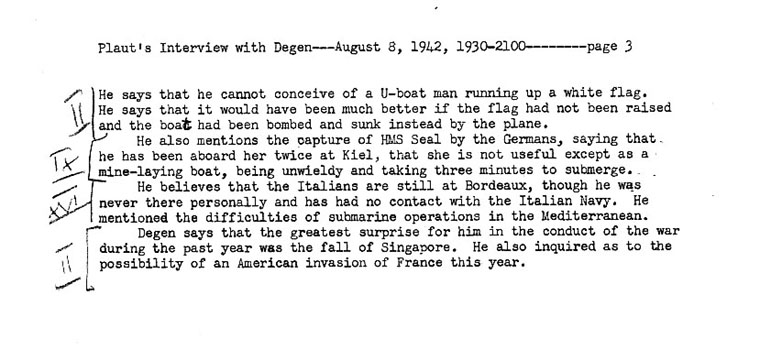| The Joint Interrogation Center at Fort Hunt was opened in August 1942. Crewmen from U-701 and U-352 were the first to arrive. In the letter below the Navy requests that the Army transfer the selected prisoners to Fort Hunt from the holding camps Fort Bragg and Fort Devens (later Fort Meade would be the primary holding camp for U-boat prisoners). |
| Op-16-F-9 | ||||||||||||||||||||||||||||||||||||||||||||||||||||||||||||||||||||
| A16-2(4) | ||||||||||||||||||||||||||||||||||||||||||||||||||||||||||||||||||||
| July 31, 1942. | ||||||||||||||||||||||||||||||||||||||||||||||||||||||||||||||||||||
|
||||||||||||||||||||||||||||||||||||||||||||||||||||||||||||||||||||
| 1. It is requested that the Prisoners of War listed below be delivered to Fort Hunt for interrogation on Monday, August 3, 1942, or as soon thereafter as practicable: | ||||||||||||||||||||||||||||||||||||||||||||||||||||||||||||||||||||
|
||||||||||||||||||||||||||||||||||||||||||||||||||||||||||||||||||||
| 2. The following prisoners, now at Fort Bragg, should NOT be brought to Fort Hunt and, insofar as O.N.I., is concerned, can be transferred to a permanent internment camp: | ||||||||||||||||||||||||||||||||||||||||||||||||||||||||||||||||||||
|
||||||||||||||||||||||||||||||||||||||||||||||||||||||||||||||||||||
| 3. It is further requested that the Provost Marshal General recommend to the Commanding Officers, Fort Bragg and Fort Devens, that the Prisoners of war be NOT advised beforehand that they are to be transferred, that care be taken to keep the officers and men separated, and that RATHKE be transferred in the first contingent so that he will be deprived of any opportunity to instruct his men. Men from Fort Bragg and Fort Devens should not be permitted to come in contact with each other. | ||||||||||||||||||||||||||||||||||||||||||||||||||||||||||||||||||||
| John L. Riheldaffer. | ||||||||||||||||||||||||||||||||||||||||||||||||||||||||||||||||||||
| Dict. 7/31/42. by Cdr. Riheldaffer. | ||||||||||||||||||||||||||||||||||||||||||||||||||||||||||||||||||||
| Typed - Lesnick. | ||||||||||||||||||||||||||||||||||||||||||||||||||||||||||||||||||||
| Kapitänleutnant Degen was the first prisoner to arrive at Fort Hunt on August 5th. The rest of the U-701crewmen arrived on the 6th. U-352 Commander, Kapitänleutnant Rathke arrived on the 8th and the other members of his crew on the 10th. Prisoners from U-210 arrived direct from their arrival in the U.S. on August 12th. Interviews with Navy interrogators began on August 6th and lasted until 8 September when the U-701, U-352 and U-210 prisoners were turned over to the Army for further interrogation. Prisoners from these boats left Fort Hunt for permanent internment on September 21 and 22nd. |
Interrogation of Kpt. Lt. (Lt. Sr.) Degen, |
||||||||||||||||||||||||||||||||||||||||||||||||||||||||||||||||||||||||||||||||||||||||||||
by Lt. Com. Albrecht. |
||||||||||||||||||||||||||||||||||||||||||||||||||||||||||||||||||||||||||||||||||||||||||||
|
||||||||||||||||||||||||||||||||||||||||||||||||||||||||||||||||||||||||||||||||||||||||||||
- 1 - |
||||||||||||||||||||||||||||||||||||||||||||||||||||||||||||||||||||||||||||||||||||||||||||
|
||||||||||||||||||||||||||||||||||||||||||||||||||||||||||||||||||||||||
- 2 - |
||||||||||||||||||||||||||||||||||||||||||||||||||||||||||||||||||||||||
|
||||||||||||||||||||||||||||||||||||||||||||||||||||||||||||||||||||||||||||||||||||||||||||||||
- 3 - |
||||||||||||||||||||||||||||||||||||||||||||||||||||||||||||||||||||||||||||||||||||||||||||||||
|
||||||||||||||||||||||||||||||||||||||||||||||||||||||||||||||||||||
- 4 - |
||||||||||||||||||||||||||||||||||||||||||||||||||||||||||||||||||||
| Listening to the recordings of interviews, the interrogating officers produced a written summary |
INTERVIEW OF DEGEN BY LT. CDR ALBRECHT & LT. IZZARD. |
||
Questioned as to his attitude during interrogation he said that all military matters in Germany were highly secret. The destroyer Commanders who took part in the Norwegian campaign were not told, until a day before it took place. |
||
Stated that in the present circumstances he was prepared to disclose his date of departure on his last war cruise. He left Brest on May 19th and Lorient on May 20th. |
||
Told that the saboteurs' U-boat left later but arrived earlier he said that might be the case. They, on a special mission, no doubt proceeded at a much greater speed. His cruise was to an operational area and it was his duty to conserve his furl by proceeding at a very economical speed. The limits he reached in his operational area were South about 15 miles south of Cape Lookout; North, opposite the Chesapeake Light. The two most important men he took on board at Brest were Fähnrich Lange and Steuermanns Unteroffizier Grundler. |
||
His total crew was 45 men including officers. |
||
He did not receive any oil from a supply U-boat - - he didn't need any, as once he reached his operational area to all intents & purposes he remained on the same spot. He had ample fuel on board. |
||
Stated the Germans termed the shortest route between New York and Lisbon "the neutral course". |
||
Stated the Portuguese sailing ship he met en route was the "Gazella Primera" and it was proceeding to the Newfoundland Banks to fish. It was a three master. When well across the Atlantic he met the Swedish liner "Drottningholm" and turned round and chased her half a day, at high speed, thereby losing a day and a half's Westing. The weather had been bad at first and this had delayed him some time. When he met "Drottningholm" he had been unable to fix his position for some days owing to heavy cloud. He had been warned of the course she would take but according to his reckoning she was well off it - actually he himself was in error. He was still chasing the Swede when he again was warned by radio that she had left New York on June 3rd for Lisbon. After that he approached nearer and identified her. Shortly after he sighted an Eastbound British liner of about 15,000 tons. He turned and chased her too, also losing about a day and a half. The liner was steering a general course of 600, and deviating in a regular zigzag to 900 and then to 300. Degen said he knew this as he followed a parallel course for some time. |
||
| He denied that he was ever in direct contact with any other U-boat over here. He arrived over the Shelf on 11th June. He was reluctant to make his first landfall on the American coast with a new moon, which he remembers as being on the 13th. He said it was bad for business. He therefore made up his mind to lie over the Shelf for a few days. On 12th June he was attacked by an aircraft of the same type which finally sunk him. He had just time to crash dive. He stated five bombs were dropped in a straddle round him when he had got down to about 40 feet. His lights failed and instrument glasses were smashed in the Control Room. The damage was not serious. | ||
| He moved in to the coast about 16th June. The first incident was the sighting of a southbound 8000 ton freighter. He followed her and fired two torpedoes both of which missed. The ship then escaped. She was too fast. | ||
| The next encounter was on the night of the 17th, when U-701 surfaced close to a U-boat chaser. This vessel challenged the U-boat with a series of B's from a signaling lamp. Degen said that he thought he was going to be rammed and he put about and drew away. Degen said that he thought he was going to be rammed and he put about and drew away. The next day he saw her again escorting a tanker and a freighter northbound. When they had passed his position the U-boat chaser turned around and dropped some depth charges near him. On the night of the 19th he sunk the U-boat chaser with gunfire. There were no further events until the torpedoing of "British Freedom". | ||
- 1 - |
||
INTERVIEW OF DEGEN BY LT. CDR ALBRECHT & LT. IZZARD. |
||
He stated that he followed the Great Circle course from Lorient to Hatteras. He said is was general for U-boat commanders to follow Great Circle courses from their bases to their operational areas off the U.S.A. coast. At the same time some commanders deviated to the Southward because they said that the better weather to the south enabled them to conserve fuel and make a shorter passage although the distance covered was actually longer. He stated that he did not come down the American coast to reach Hatteras. He emphasized the weather was a most important factor for U-boats, and that this spring he spent two weeks in the North Atlantic when the wind blew gale force the whole time. He saw a number of ships but could not make a single attack. |
||
He stated that his quartermaster, Kunert, was remarkably efficient as a navigator and that once when his echo-sounding device failed Kunert brought the U-boat back from mid-ocean to their French base safely through fog. |
||
He stated that "Sonderführer" were really civilians who had been given honorary naval rank. The majority were propaganda correspondents and cameramen. They wore the uniforms of Leutnant zur See with a special badge on their arm. He stated that leave for U-boat crews depended upon the time necessary to repair a U-boat after an operational cruise. If a U-boat was comparatively undamaged, and could be turned around in 8 days or less no leave was granted. The crew was supposed to get its rest on the voyage home to their base. He stated that he saw Dönitz after each trip when he personally reported to him. He said that Dönitz took great personal interest in each U-boat commander, pointed out his mistakes, made corrections to tactics and gave advice to them. He was friendly to the majority but acted ruthlessly against those who failed, taking their boats away from them. He said this had happened very seldom. He said that a number of the older commanders had been given shore jobs because either they had developed illnesses or had lost their nerve. He said that one personal friend of his who had operated a 250-ton U-boat off the East Coast of England, at the beginning of the war, had become a complete nervous wreck and was hardly capable of holding a shore position which he had recently been given after a long period in a nerve sanitarium. He stated that there was a certain amount of ill feeling between the "Imperial Navy" and the "Party Air Force"; that Goering saw to it that the Air Force had the best of everything and that airmen, by shooting down 20 enemy aircraft, gained a comparatively easy "Ritterkreuz" compared to the 100,000 tons of shipping which a U-boat commander had to sink for the same award. |
||
He stated that Dönitz was more popular than Räder because he had more success and that if Hitler wished to know anything about U-boat warfare he called for Dönitz and not his superior officer, Räder. |
||
He had expected either to survive or be killed in his U-boat career. He never dreamed that he would ever be taken prisoner and never thought of how he should behave as such. |
||
- 2 - |
||
| Kapitänleutnant Degen agreed to make a statement concerning his date of departure and operating area. The handwritten statement and typed and signed version follow. |
 |
10. August, 1942 |
||
| Ich erklare hiermit, dass Ich keine Person, weder Zivil noch deutsches Militar, and der amerikanischen Kuste an Land gesetzt habe. Mir ist von solchen Vorangen nichts bekannt geweses. | ||
| Ich bin ausgelaufen aus Brest; 19.5.42 | ||
| aus Lorient; 20.5.42 | ||
| An der amerikanischen Kuste hab Ich im Gebiet Cape Hatteras gestanden. Nordgrenze war Chesapeake Lightship, Sudgrenze war ungefahr 15 m. sudlich Cape Lookout. Ausserhalb dieser Linien bin Ich nicht gewesen. | ||
 |
||
| DEGEN | ||
| Kapitänleutnant (ISN 5-1N) | ||
| Interviews were summarized by the interrogating officer and then the individual statements were assigned to the chapters of the Interrogation Report as in the following example |
 |
 |
 |